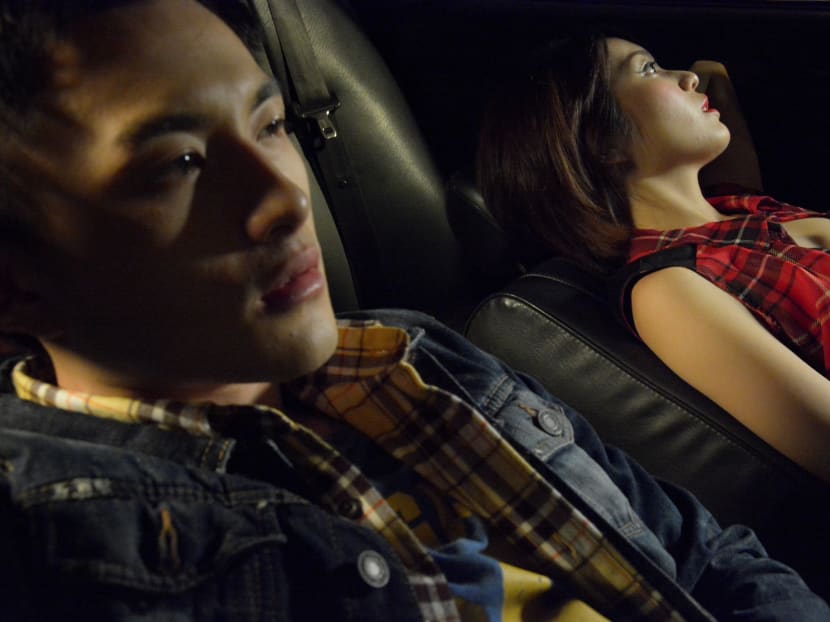Ms J Contemplates Her Choice
SINGAPORE – Ms J Contemplates Her Choice, starring the eminently watchable Kit Chan as the titular character whose radio show dispensing textbook advice to people with trite problems is derailed when a murderous mystery caller forces her to choose his victims, is less a whodunit and more an allegory grounded in the specificity of Singaporean life. (The film, which also stars Xiang Yun, Bobby Tonelli, Shane Pow and Seraph Sun, premiered at the Singapore International Film Festival last year.)

Shane Pow and Seraph Sun star alongside Kit Chan in Ms J Contemplates Her Choice.
SINGAPORE – Ms J Contemplates Her Choice, starring the eminently watchable Kit Chan as the titular character whose radio show dispensing textbook advice to people with trite problems is derailed when a murderous mystery caller forces her to choose his victims, is less a whodunit and more an allegory grounded in the specificity of Singaporean life. (The film, which also stars Xiang Yun, Bobby Tonelli, Shane Pow and Seraph Sun, premiered at the Singapore International Film Festival last year.)
More than a psychological thriller, Ms J is an exploration of how the past shapes the present and, perhaps, the illusion of agency. It ruminates on that age-old debate between fate and free will: Are we in control of our own fortunes, or are we playthings of the gods? What happens when we are forced to play God?
Sure, the movie does have glaring faults – stilted dialogue, the clumsy way in which the mystery of the killer unravels, the casting of the child actors – but the way in which it presents its ideas is thought provoking enough to make this a film worth watching.
One thing it does particularly well is to portray Singapore as a haunted urban dystopia riddled with social malaise. Some characters and incidents represent self-serving, amoral pragmatism; others a higher ideal – two fundamental and divergent life choices – but none of them end well or get the upper hand. Eerie, unnatural urbanscapes set to a soundtrack of incessant drilling add to a sense of crippling isolation, driving home the sneaky suspicion that, to paraphrase one of the characters, in this landscaped swimming pool of a burgeoning metropolis, there lurks an inexplicable shark.
Quite evidently from the title, the film wants to make us conscious of the bombardment of choices we make at every turn – some tiny and inconsequential, some monumentally portentous – and this hyper-awareness is distilled even into the mundane act of shopping for groceries.
But who is really in control, and can that person be trusted – even, or perhaps especially, when that person is yourself? Even when the power of choice is seemingly taken away, its shadow always resurfaces, like contraband chewing gum that sticks to Chan’s shoe. And when the ghosts of our past return to haunt us as faceless wielders of ultimate power, our past choices morph into our future destiny.
That struggle is symbolised in the film’s Chinese title, which is the name of the children’s game played when there is a choice to be made between two people. Is Rock Scissors Paper a game of chance or strategy? Perhaps, in order to win, you can’t have one without the other.
As in any “arty” film, there are more questions than answers. Because she stands in for any one of us, the “Ms J” of the title is a universal cipher – the “J” a floating signifier, the “Ms” redolent with ambiguity. At the end of the film, does she choose life or death? The choice is left up to the viewer – or rather, forced upon us.
(NC16, 88mins)







